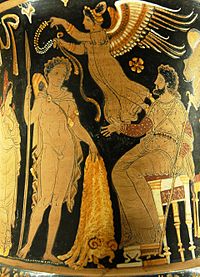The Argonauts (/ˈɑːrɡənɔːt/; Ancient Greek: Ἀργοναῦται, Argonautai, 'Argo sailors') were a band of heroes in Greek mythology, who in the years before the Trojan War (around 1300 BC)[1] accompanied Jason to Colchis in his quest to find the Golden Fleece. Their name comes from their ship, Argo, named after its builder, Argus. They were sometimes called Minyans, after a prehistoric tribe in the area.
https://en.wikipedia.org/wiki/Argonauts
In Greek mythology, the Golden Fleece (Greek: Χρυσόμαλλο δέρας, Chrysómallo déras) is the fleece of the golden-woolled,[a] winged ram, Chrysomallos, which was held in Colchis.[1] The fleece is a symbol of authority and kingship.
In this fictional tale, based on supposed true events, it figures in the tale of the hero Jason and his crew of Argonauts, who set out on a quest for the fleece by order of King Pelias, in order to place Jason rightfully on the throne of Iolcus in Thessaly. Through the help of Medea, they acquire the Golden Fleece. The story is of great antiquity and was current in the time of Homer (eighth century BC). It survives in various forms, among which the details vary.
Nowadays, the heraldic variations of the Golden Fleece are featured frequently in the Republic of Georgia, especially for Coats of Arms and Flags associated with Western Georgian (Historical Colchis) municipalities and cities, including the Coats of Arms of City of Kutaisi, the ancient capital city of Colchis.
https://en.wikipedia.org/wiki/Golden_Fleece
In Greek mythology, Medea (/mɪˈdiːə/; Ancient Greek: Μήδεια, Mēdeia means "planner / schemer") is the daughter of King Aeëtes of Colchis, a niece of Circe and the granddaughter of the sun god Helios. Medea figures in the myth of Jason and the Argonauts, appearing in Hesiod's Theogony around 700 BC,[1] but best known from Euripides's tragedy Medea and Apollonius of Rhodes' epic Argonautica. Medea is known in most stories as a sorceress and is often depicted as a priestess of the goddess Hecate.
She aids Jason in his search for the Golden Fleece out of love, assisting him with her magic and saving his life in several quests, playing the role of an archetypal helper-maiden, before abandoning her native Colchis, marrying him, and fleeing with him westwards where they eventually settle in Corinth. Euripides' 5th century BC tragedy Medea, arguably the best known adaptation of the Medea myth, depicts the ending of said union with Jason, when after ten years of marriage, Jason abandons her to wed king Creon's daughter Creusa while Medea and her sons by Jason are to be banished from Corinth. In revenge, she murders Creusa and the king with poisoned gifts, and later murders her own sons by Jason before fleeing for Athens,[2] where she eventually marries king Aegeus. Other traditions mention several other causes of death for Medea's sons.
What happened afterwards varies according to several accounts. Herodotus in his Histories mentions that she ended up leaving Athens and settling in the Iranian plateau among the Aryans, who subsequently changed their name to the Medes.[3]
| Medea | |
|---|---|
 Medea on her golden chariot, by Germán Hernández Amores |
https://en.wikipedia.org/wiki/Medea

No comments:
Post a Comment